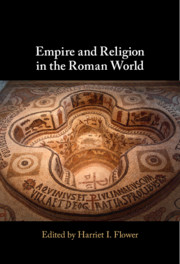Book contents
- Empire and Religion in the Roman World
- Empire and Religion in the Roman World
- Copyright page
- Frontispiece
- Contents
- Figures
- Table
- Contributors
- Acknowledgments
- Introduction
- Part I Empire
- Chapter 1 Germs and Empire
- Chapter 2 Imperial Integration on Rome’s Atlantic Rim
- Chapter 3 The Ambitions of Government
- Chapter 4 Contingency and Context
- Part II Religion
- Appendix: Bibliography of Brent D. Shaw’s Publications to 2020
- Index
- References
Chapter 4 - Contingency and Context
The Origins of the Jewish War against Rome
from Part I - Empire
Published online by Cambridge University Press: 26 August 2021
- Empire and Religion in the Roman World
- Empire and Religion in the Roman World
- Copyright page
- Frontispiece
- Contents
- Figures
- Table
- Contributors
- Acknowledgments
- Introduction
- Part I Empire
- Chapter 1 Germs and Empire
- Chapter 2 Imperial Integration on Rome’s Atlantic Rim
- Chapter 3 The Ambitions of Government
- Chapter 4 Contingency and Context
- Part II Religion
- Appendix: Bibliography of Brent D. Shaw’s Publications to 2020
- Index
- References
Summary
This chapter reexamines the extensively discussed evidence for the circumstances that drove the Jews to a seemingly irrational and hopeless challenge to the power of Rome. The account of Josephus, on which we almost exclusively rely, offers the teleological scenario of a long build-up of hostility that issued inevitably in disaster. While acknowledging the background and circumstances that lay behind the conflict, this chapter emphasizes the numerous contingencies, unanticipated events, personalities, and miscalculations that played a key role in bringing it about. The tension and anxiety that had built up for two generations in a series of individual episodes supplied a significant impetus. But error, accident, and unintended consequences are critical to understanding the course of events. Josephus’ sense of inevitability, born of hindsight and his special situation, needs a corrective.
- Type
- Chapter
- Information
- Empire and Religion in the Roman World , pp. 94 - 114Publisher: Cambridge University PressPrint publication year: 2021
References
- 1
- Cited by



